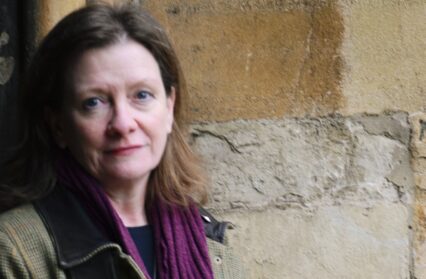Cardiff-born Trezza Azzopardi’s debut novel, The Hiding Place, was nominated for the Booker Prize in 2000 and won the Geoffrey Faber Memorial Prize. Her subsequent three novels have marked her out as one of the finest novelists of her generation. Her Welsh-English-Maltese roots inform her fiction of familial dramas. For many years now, Trezza has taught on the famous Creative Writing course at UEA. Gary Raymond caught up with her for a wide-ranging discussion on the craft of writing, the influences of childhood, and the minefield of teaching students in the age of trigger-warnings.
Gary Raymond: I’m interested in your thoughts about the state of contemporary literature.
Trezza Azzopardi: I’m interested in having a conversation about writing full stop. Because it’s difficult to talk about anything without issuing a trigger warning. Some things seem to be off-limits these days. It’s not off-limits to me in my writing, but some things are off-limits as a professional teacher in higher education. I teach a range from PhD to second year undergrads and the material I use doesn’t differ from undergraduate to postgraduate because our literary works can be read by anyone. But what I think is markedly different is that the older the student, the more relaxed they are about reading works that may be offensive or difficult and the younger the student, the less able they are to cope with that without being warned about it at first. I understand how some students need to be warned about things they’re going to come across, but I also want them to come across it with an open mind. For example, I use an extract from American Psycho, and I have to say, “If you want to read the rest of this, I have to warn you that things get particularly difficult.” I want to let them discover the same way I did how absolutely offensive this character is, and yet how brilliant the writer is for creating this character, and to be able to differentiate between the two. I haven’t got there yet with that.
Gary Raymond: When did you start giving those trigger warnings?
Trezza Azzopardi: I was advised by the hierarchy of the university that this would be necessary. There’s been a backlash against using the phrase ‘trigger warning’, because if you trigger warning everything, if you have to trigger warning, as I’ve heard, Tess of the d’Urbervilles, then we’re in trouble. Because if somebody can’t read that book without being warned about the content, then where do you end, what is acceptable? Bambi isn’t acceptable. God knows, I saw Bambi as a child, and it really affected me, but nobody gave me a trigger warning. And I’m glad because things should be allowed to affect us as human beings. And I think that’s part of the culture that I’m just about getting used to at the moment. It’s not something that I’m fully comfortable with, especially in literature where I think we need surprises, we need twists. We need to be wrong-footed. And that can’t happen if you’re constantly making the person aware that that might happen. Nobody warns you when you step off the pavement and get hit by a car; that’s the kind of warning we need, where somebody interjects and says “car coming”!, not the kind of warning that involves fiction which I think is a completely separate area from reality. And, by definition, so it should be.
Gary Raymond: But there is a broader question there about this interest in feelings. In one sense, we’re trying to protect young people from how a short story or a novel might make them feel. Yet at the same time, we’re completely obsessed with feelings, to the extent where we don’t pay attention to much else. Feelings overriding facts, for instance.
Trezza Azzopardi: I think it’s a modern and young phenomenon. When I was a kid, nobody cared about your feelings and we weren’t allowed to voice them. I find there’s a gulf there. Part of what journalists are doing, for instance, is they’re trying to bridge the gulf by saying, “How did that make you feel?” It’s just lazy, they don’t care how you feel, they’re filling space. The concern now is all about your mental health. I’m all for that in theory, but let’s not cheapen what can be a very difficult subject because actually, it’s really just glossing over what is a big issue in this country now, especially with young people since lockdown.
… to read the rest of this article, subscribe to the new Wales Arts Review substack.



 Enjoyed this article? Support our writers directly by buying them a coffee and clicking this link.
Enjoyed this article? Support our writers directly by buying them a coffee and clicking this link.







